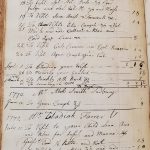A few weeks ago, I wrote about Moses Mosman, a doctor from Sudbury, Massachusetts at the start of the American Revolution who also was also a gun maker. Right after I sent the article, I made a trip to the American Antiquarian Society in Worcester as they happened to have three of his account books in their extensive collection and I spent an entire day flipping through the pages of these wonderful books!
As mentioned in the previous article, Mosman was born in Sudbury in 1742 and his account books start in 1763 when he was 21 years old. They list each of his patients and what he treated them for, as well as their wives and children. He mentions what he gave them for medication, the cost, and how he was paid. Sometimes in cash, a pig, a chicken, cloth, and sometimes gun parts. Reading each listing he seems to have begun working on guns by 1770 or so. As the start of the American Revolution grew closer, he did quite a bit of gun work. In the fall of 1774 around the time of the so-called “Powder Alarm” in Charlestown, Massachusetts, quite a few of his patients are having him fix their guns. It is also around this time that the Town of Sudbury hires him for 9 days to repair the town-owned guns to make sure they are ready for service.
 Having grown up in the neighboring town of Concord and studying local town records as well as those in the Massachusetts Archives Collection, I recognize many of the names of the folks he either took care of or repaired their firearns. One was Aaron Haynes, a captain in one of Sudbury’s militia companies. On March 22, 1775, he sent in a return of his company and stated he had 60 “men- well Provided with fire armes.” According to the pages in the Mosman book, Haynes had issues with his own gun and on April 8, 1775, just 11 days prior to the outbreak of the war he wrote “1775 April 8 To mending your gun and finding a Lock.” It seems the gun lock must have been in such bad shape that it couldn’t be repaired and had to find a new one and fit it to his gun.
Having grown up in the neighboring town of Concord and studying local town records as well as those in the Massachusetts Archives Collection, I recognize many of the names of the folks he either took care of or repaired their firearns. One was Aaron Haynes, a captain in one of Sudbury’s militia companies. On March 22, 1775, he sent in a return of his company and stated he had 60 “men- well Provided with fire armes.” According to the pages in the Mosman book, Haynes had issues with his own gun and on April 8, 1775, just 11 days prior to the outbreak of the war he wrote “1775 April 8 To mending your gun and finding a Lock.” It seems the gun lock must have been in such bad shape that it couldn’t be repaired and had to find a new one and fit it to his gun.
Other patients’ entries record things like “To bleeding your wife” and in the next entry “to mending your gun lock.” Although this listing isn’t repairing a gun, another patient was Benjamin Berry from Sudbury. I had copies of all his petitions for loses from the Massachusetts State Archives. Berry lost his arm as a sailor on Benedict Arnold’s Lake Champlain fleet on October 11, 1776. After he recovered enough to go home, he went back to Sudbury and was taken care of by Dr. Mosman.
Objects, as well as books and documents can really help to give us a look into the lives of those who came before us. The Mosman account books are another example of this fascinating period.




